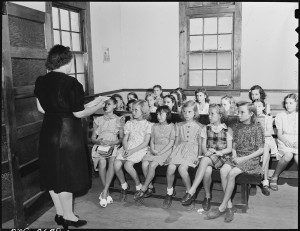I hear it a lot from other Pagan parents – they don’t want to indoctrinate their children, to raise them in their religion. There are a lot of reasons for this. Some choose this path because of their own childhood experiences, others because what they’ve heard of these experiences, and there are myriad other reasons as well. But it is my strong belief that many Pagan parents take this idea and reasoning too far.
Instead of avoiding indoctrinating their children, I have seen many parents completely avoid educating their children on the topic of religion at all. This is something that frightens me as a person raised in an evangelical Christian household. This kind of Christianity is designed to exploit those who have never been educated about religion – it promises easy answers and a sure way to salvation, which is startlingly easy to convince people that they need.
I saw many friends come in to fundamentalist circles because of this lack of religious education, and I saw many of them leave it as well – disillusioned not just with this brand of Christianity, but with religion and spirituality as a whole. The ones that stayed are, in my opinion, not much better off; they are willing to accept just about anything that is accepted by the evangelical culture, even if it goes against their own previously-held ethics and beliefs.
Of course, not every child that is raised in a completely religion-free zone will be taken in by this, but I have seen it often enough that it worries me. Finding the balance between not talking about religion and talking about it as the only right way can be very difficult, but I believe it is essential to my children’s future spiritual well-being, no matter where they decide they feel at home religiously.
This is one of the reasons I try to take my children to the UU service each Sunday, and why I teach Religious Education classes at my church. I think UUs have really hit that sweet spot with their curriculum – the first few years devoted to understanding morality through a secular lens that relies on one’s own heart and conscience, and then introducing the traditions and beliefs of many religions from around the globe.
I have taught children in my UU class about the Pagan origins of Halloween, and how modern-day Pagans honor our beloved dead on this day. Each morning, my oldest daughter joins me in my prayers; welcoming the brilliant sun and asking for Her blessings of light and warmth. She also occasionally prays to Allah with her grandparents, and to Jesus with my parents.
She isn’t at all sure where she will settle religiously (she is only seven!) but knowing the basics of practice and belief – and knowing that many people will believe and practice very differently – has helped her to develop her critical thinking skills in a way I don’t believe would be possible otherwise. After one Sunday spent at my mother’s church, she came home and said to me: “Grandma’s church doesn’t like questions, but I love asking questions. Saying they are bad doesn’t sound right to me.”
What a parenting moment! The kind where I felt as if I might be doing at least something right. And I believe the UU curriculum has a lot to do with that, teaching how to compare and think critically about ethics and beliefs without judging or condemning another’s religion. I couldn’t be more grateful that my children are able to receive this high level of religious education.













